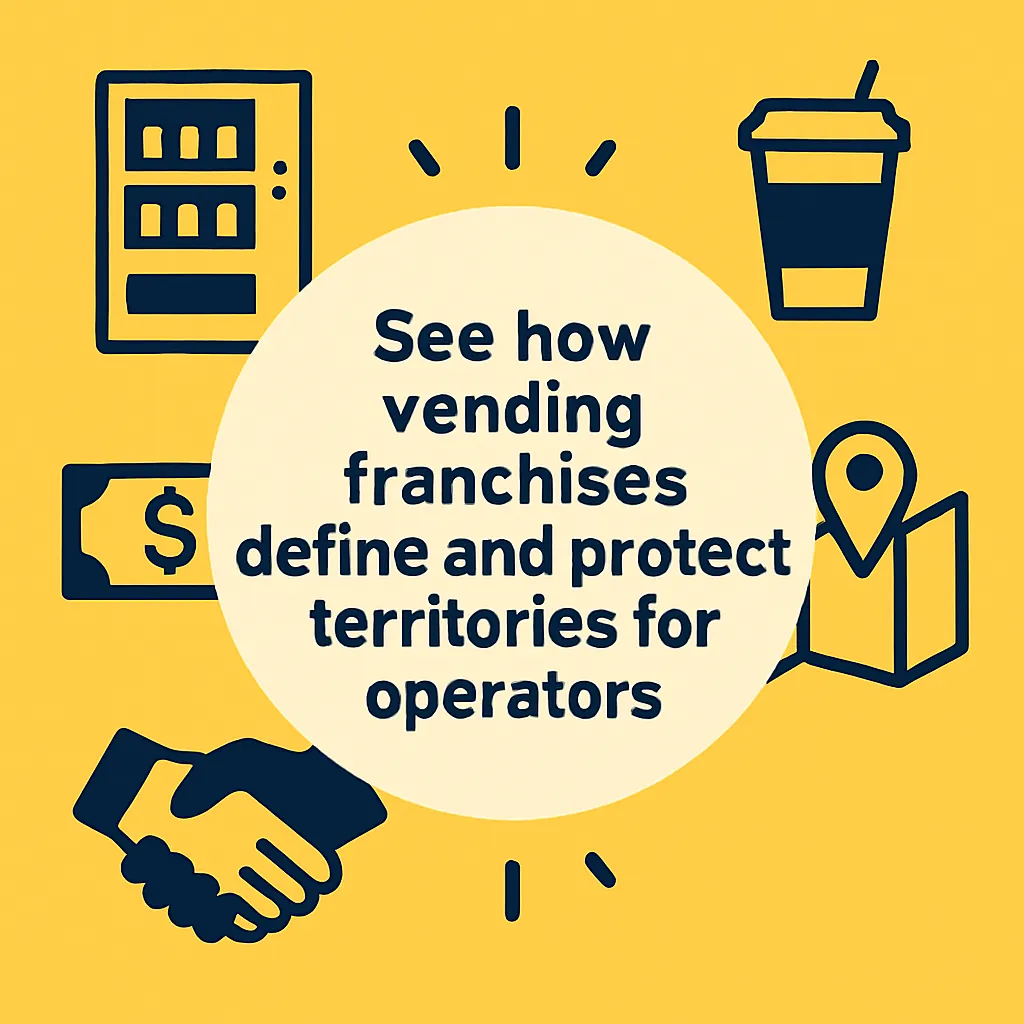Franchise Territories in Vending
See how vending franchises define and protect territories for their operators.
Back to Vending Franchises ResourcesSee how vending franchises define and protect territories for their operators.
Back to Vending Franchises ResourcesStart your 30-day free trial and get instant SMS and email alerts whenever a local business needs vending service. These are real location leads to help you grow your route — you decide which ones to buy, no obligations or contracts.
![]() Guaranteed geographic area for vending machine placement
Guaranteed geographic area for vending machine placement
![]() Protection from internal brand competition boosts confidence
Protection from internal brand competition boosts confidence
![]() Clear boundaries foster strategic growth and market penetration
Clear boundaries foster strategic growth and market penetration
30 days free, then $39 / month.
No Commitment. Cancel Anytime.

For individuals looking to enter the vending industry through a franchise model, understanding the concept of franchise territories is paramount. A well-defined territory is more than just a line on a map; it's a strategic asset that protects a franchisee’s investment and provides a foundation for sustainable growth. These territories typically grant exclusive rights to operate within a specific geographic area, ensuring that a franchisee doesn't face direct competition from other operators within the same franchise system.
The method of defining these territories can vary significantly between franchisors. Some might use specific zip codes or county lines, while others could base them on population density, the number of potential businesses, or even a defined radius around a central point. This clarity is vital for a franchisee, as it dictates the scope of their market and the potential for expansion. Before committing to a vending franchise, it's essential to thoroughly review how territories are delineated and what level of exclusivity is offered. This directly impacts the revenue potential of airport vending machines and other high-traffic locations.
Protection of these territories is a key responsibility of the franchisor. They establish and enforce rules to prevent any franchisee from encroaching on another’s dedicated space. This enforcement mechanism provides peace of mind to operators, allowing them to focus their efforts on securing locations and servicing machines within their designated zone. Effective territory management also supports the overall brand integrity by preventing oversaturation in certain areas, which could dilute market share for all involved. For instance, detailed agreements about territorial boundaries are common in contracts, as outlined in discussions about questions to ask before signing a vending contract.
The size and characteristics of a territory can significantly influence an operator's business strategy. A larger, less dense territory might offer ample growth opportunities but could require more travel and logistical planning. Conversely, a smaller, highly dense urban territory might offer efficiency in servicing but could also become saturated more quickly. Franchisees often weigh these factors against their personal business goals and operational capabilities. While territories are designed to be stable, some franchises may offer options for expansion or modification under specific conditions, often tied to performance metrics or the acquisition of adjacent territories. This dynamic approach ensures that successful franchisees can continue to grow their footprint. Understanding understanding vending location exclusivity is crucial for long-term success.
Vending Exchange connects vending operators with real businesses actively looking for vending services—including traditional machines, AI coolers, and office coffee. Get instant SMS and email alerts when new opportunities are available in your area. No contracts or monthly fees—just buy the leads you want. Start your free 30-day trial today and grow your vending business on your terms.
A franchise territory defines the exclusive geographic area in which a franchisee is permitted to operate their vending business, typically outlined in the franchise agreement.
Territories protect a franchisee's investment and effort by preventing other franchisees from operating in their designated area, ensuring a defined market for growth.
Territories can be defined by zip codes, population density, geographic boundaries, or a specific number of businesses or potential locations within an area.
Many vending franchises offer exclusive territories, meaning no other franchisee of the same brand can operate within that defined area.
Operating outside an assigned territory is typically a breach of the franchise agreement and can lead to penalties or termination, depending on the contract terms.
Larger territories offer more potential for growth but may require more travel and resources, while smaller, dense territories can mean more efficient operations.
Some franchise agreements allow for territory expansion under certain conditions, such as meeting performance benchmarks or purchasing additional areas from the franchisor.
Franchisors typically enforce territory boundaries through contract provisions and may intervene if another franchisee encroaches on a protected area.
Look for clear definitions, exclusivity provisions, growth potential, and policies for dispute resolution regarding territory boundaries.
No, not all vending franchises offer exclusive territories. Some might use a non-exclusive 'protected area' model or operate without strict territorial boundaries, which is important to clarify.